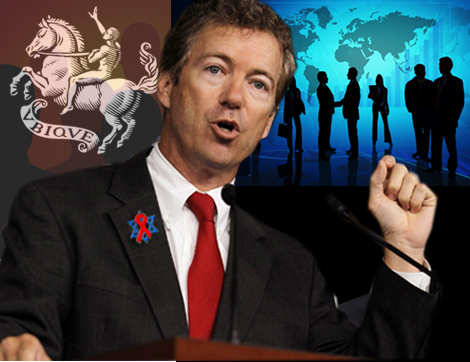
• Kentucky senator getting key financial, propaganda support from high-placed Bilderbergers
By Michael Collins Piper
More disturbing evidence suggests Senator Rand Paul (R-Ky.) is getting critical high-level support from the establishment elite who seem to favorably perceive Paul as distancing himself from his father, retired Representative Ron Paul (R-Texas).
On June 19 The Washington Post—a key voice for the powerful globalist Bilderberg group—featured a front-page story asking “Is Rand Paul going mainstream, or vice versa?”
Asserting that Paul “is talked about as a credible Republican presidential contender in 2016,” who is “no longer marginalized by his party—or dismissed by the opposition,” the story promoting Paul appeared on the very day (though the Post didn’t mention it at the time) Paul was the keynote speaker at a fundraising banquet for the Competitive Enterprise Institute in Washington.
Among the biggest donors for that gala featuring Paul were Internet giants Google and Facebook—both of which have been represented at recent Bilderberg meetings alongside Washington Post Company chairman Donald Graham who is also a member of Facebook’s board of directors.
The Post story was almost an eerie echo of a report in AMERICAN FREE PRESS as far back as May 28, 2012, which noted that some concerned patriots were already speculating Paul was in the process of what one source described as a looming “rewrite” of his father’s views on matters of national security and foreign policy, positions that, quite naturally, rankled the Bilderberg elite.
The Post cited an unnamed but “well-known” Republican who described Paul as “a work in progress,” and noted that the GOP power broker “spoke on the condition of anonymity, sensitive to the fact that public knowledge of their cordiality wouldn’t benefit either of them.”
Quite notably, however, the Post did not hesitate to make reference to favorable remarks about Paul by former Representative Vin Weber (R-Minn.), describing Weber as a “pillar of the party establishment in Washington.” The fact that Weber is being referenced as being inclined toward Paul is telling, if not ominous, from the perspective of those who admired the work of Paul’s father.
While citing Weber’s comment that he, too, has a “libertarian streak,” and that today’s Republicans find “the real world is heightening their libertarian instincts,” what the Post did not mention—but which informed members of its elite readership know well—is that Weber is a director of the Council on Foreign Relations—the New York offshoot of the London-based Royal Institute for International Affairs, the foreign policy arm of the Rothschild banking dynasty.
A veteran of the now-infamous Project for the New American Century, which declared the need for a “New Pearl Harbor” to stimulate American meddling around the globe, Weber once urged the GOP to become “America’s new internationalist party.”
The Post did not mention, though, that Paul has a close, direct tie to Weber’s intrigues: Paul’s chief 2010 Senate campaign tactician—deployed to work for Paul by the Republican National Committee—was Trygve Olson, a former top-level operative of the International Republican Institute (IRI), a creation of—and funded by—the National Endowment for Democracy (NED) of which Weber was chairman (and on whose board of directors he remains).
Described by outspoken columnist Paul Craig Roberts as “an election-rigging tool of U.S. hegemony,” the IRI (and the NED) stand in stark opposition to the nationalist and non-interventionist point of view so effectively articulated by Rand Paul’s dad.
The Post also mentioned that David Lane, a Christian conservative who took Paul on a seven day trip to Israel in January, said that Paul “is closer to where I am philosophically than he is to where his dad is.”
In a related vein, the Post noted that there is a “thaw” between Paul and the hard-line pro-Israel Republican Jewish Coalition (RJC), which was previously suspicious of Paul. Paul recently met with that group’s board. RJC Executive Director Matthew Brooks said of the meeting: “There were some pleasant surprises,” adding that “while there may be areas of disagreement, [Rand Paul] is very, very different—and certainly different with regard to his father.”
According to Brooks, Paul still wants to eventually end all U.S. foreign aid—including aid to Israel. What Brooks did not mention, however, is an unusual, little-known fact readers of The Spotlight (forerunner of AFP) learned in the mid-1980s: The “hard right” in Israel advocated breaking Israeli reliance on the U.S., even including financial aid.
So while many thought the younger Paul had “stood up to the Israeli lobby” when he told the American Israel Public Affairs Committee in 2010 that he opposed aid to Israel, the truth is that his position paralleled that of even some neoconservative pro-Israel elements in the United States who—in their now-infamous “Clean Break” memo to Israeli Prime Minister Benjamin Netanyahu—urged Israeli independence from the United States and less reliance on U.S. financial support. As such, Paul’s position on foreign aid to Israel is not quite as rebellious as some might perceive.
Uncomfortable as all of these details are, they point to the need for America’s patriots to monitor Rand Paul closely as he moves toward a bigger leadership role in the years ahead.

Michael Collins Piper is an author, journalist, lecturer and radio show host. He has spoken in Russia, Malaysia, Iran, Abu Dhabi, Japan, Canada and the U.S.
